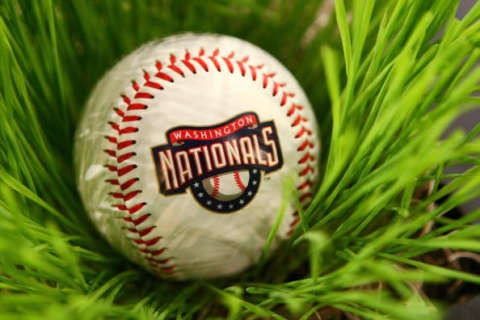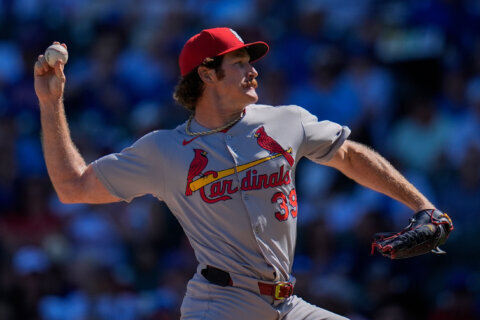For a game that celebrates its tradition, baseball has evolved quite a bit this century: “Moneyball.” Pitchers batting eighth. Launch angle. Extreme defensive shifts. Just when you thought you’d seen everything, the “opener” gets trotted out to the mound.
But viewers of the upcoming World Series should prepare themselves for a blast from the past.
The Nationals’ path to and through the playoffs has been marked from the start with a rotation that boasts a guy who once struck out 20 in a game, a former No. 1 overall draft pick, a high-priced free agent and a veteran who threw a no-hitter in his 13th career start.
“You know, I’ve said this all year — our starting pitching was the key. They’ve kept us in every ballgame this year and they’ve done it all playoffs,” said Nationals Manager Davey Martinez. “It’s nice to go out there with a Max Scherzer, Strasburg, Sanchez, Corbin. These guys are a big reason why we’re here.”
The rotation’s 3.53 ERA ranked second best in the majors during the regular season, the same with its 1,010 strikeouts thrown and 938.2 innings pitched.
“They don’t give anything away and I think that’s what makes them really special. No matter the situation, no matter how many people are on, what the score is, they don’t give in,” said shortstop Trea Turner. “They continue to stick to their game plan and use the preparation to make the best decisions and the best pitches they can.”
Just like the compass has four points, the Nationals rotation comes at you from four completely different directions-with four completely different personalities.
Mad Max
You want high heat? Scherzer throws 48 percent fastballs and his preferred pitch averages 95 miles per hour. His personality is rather easy to describe.
“Max IS Mad Max,” said catcher Kurt Suzuki.
The three-time Cy Young Award winner was steamrolling his way to a fourth Cy this summer, when a back injury sidelined the right-hander for over a month. What followed was the strangest rehab stints of recent memory: two four-inning outings while continuing to ramp up, before finally tossing 100+ pitches in his final two September starts.
“We’re at the point of the season where there’s no room for error. I cannot get hurt,” Scherzer said in August. “That’s why I’m going out there pitching under control. I’m not going to put my body in jeopardy.”
After allowing a two-run homer in the first inning of the Wild Card Game, Scherzer has resembled the pitcher who went 6-0 in June, winning his NLDS and NLCS starts. He also tossed a perfect inning of relief in Game 2 against the Dodgers.
Silent Stras
Looking for something a little off-speed? Stephen Strasburg’s bread and butter are his curveball (31%) and change-up (21%).
“I think my change-up’s really evolved over the years,” Strasburg said. “When I first started my pro career it was a pitch I threw like once or twice a game. Over the years it’s turned into a weapon.”
He’s not completely abandoning his fastball (28%), but the 30-year-old altered his winter regimen and that helped lead to setting career highs with 18 wins and 251 strikeouts in 2019.
“I obviously worked really hard last offseason; I wasn’t really satisfied with how last season ended up,” he said. “I think it’s just part of the process … learning how to take care of your body better.”
How does Suzuki see Strasburg?
“Silent assassin for Stras for sure,” the catcher said. Alliteration aside, Strasburg is 3-0 with a 1.64 ERA over three starts and a season-saving relief appearance.
Patty Ice
Wary of the sinker/slider combo? Patrick Corbin (33% and 38% usage, respectively) is just what the doctor ordered. One of the reasons he came to D.C. via free agency last winter was the chance to be a part of this staff.
“It seemed like a good fit, a team that wanted to win and had the guys here to win,” he said.
Corbin had no issues fitting in, finishing strong with a 14-7 mark that included going 4-1 in September.
“Patty Ice,” Suzuki called him. “He’s cool, calm and collected.”
The left-hander appreciates collecting input from the rest of the rotation.
“Everyone’s been around for a little bit now and has seen pretty much everybody in the league,” said Corbin. “When one guy’s out there pitching, the other guys are just communicating and talking with each other. I think what’s good is no one’s really selfish, we’re all rooting for each other, and if anything can help it’ll be great for the team.”
While the rotation is succeeding in 2019, they’re also helping lay the groundwork for the future. Young pitchers like Erick Fedde have the chance to watch and learn from the four.
“(I’m) very, very lucky to be a part of this,” said Fedde. “All four of them kind of go about in a different way. Anibal and Scherzer — you probably couldn’t have two more opposite guys and yet both still so effective. It’s good as a young guy just to be able to watch that and pick up small things from each of them and create my own personality.”
La Mariposa
How about a seven-pitch buffet? Anibal Sanchez empties the tank when it comes to variety. While the majority of his pitches are fastballs (30% four-seam and 24% split-finger), the 35-year-old also uses a sinker, curveball, change-up and slider. The veteran also brings an infectious enthusiasm to the team.
“He’s always happy, keeps the clubhouse loose and he has fun,” said Suzuki.
After starting 0-6 with an ERA of 5.10, a stint on the Injured List set the veteran straight — he went 11-2 with an ERA of 3.42 after coming back in late-May. He also set the tone in the NLCS by tossing 7.2 hitless innings to open the Game One shutout of St. Louis.
Matching up
The Nationals’ four arms will have their work cut out for them in the World Series. Houston’s trio of Justin Verlander, Gerrit Cole and Zack Grienke has 77 strikeouts over 62 playoff innings, posting a combined ERA of 3.04 against American League hitting (as in a DH instead of a pitcher).
While Scherzer, Strasburg, and Corbin have each taken turns coming out of the bullpen this month, they’ve shined as starters in the postseason with Sanchez. The quartet has tossed 88 strikeouts over 61.2 innings as starters, posting an ERA of 2.04 over the 10-game run.
“When you try and figure baseball out, it kind of goes back to starting pitching. (It’s) always been the key,” said first baseman Ryan Zimmerman. “There’s been some teams that have been successful without it, but for us it’s always been the backbone of our team.”
General Manager Mike Rizzo was the Director of Scouting Operations with the Arizona Diamondbacks when they won the 2001 World Series behind the arms of Randy Johnson and Curt Schilling. This year he’s built a rotation that not only produces on the field, but also pushes one another in the clubhouse.
“First of all you’ve got some talented, talented guys who are taking the mound for us,” said Rizzo. “They’re all competitors — they all want to one-up each other. I think it’s healthy competition and when you get guys that are in that kind of rhythm and on that kind of roll it’s fun to watch.”
As different as their personalities might be, those four points of the compass are all looking to point the Washington Nationals toward a first-ever World Championship.







